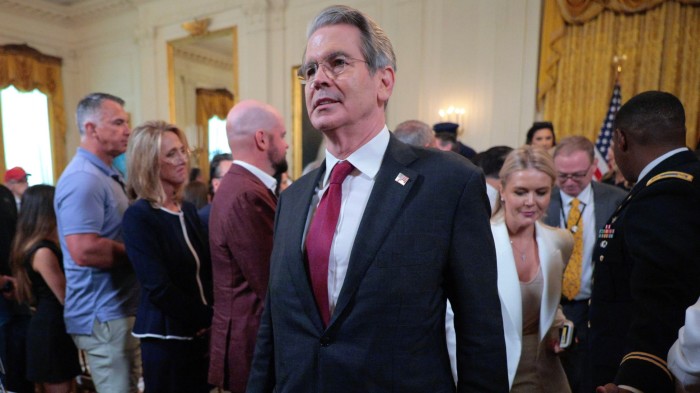The world’s main economies have agreed a deal to spare the US’s largest corporations from paying extra company tax abroad, throwing into doubt the standing of the most important world tax deal in over a century.
The settlement between Washington and different members of the G7 group of main international locations might basically alter a landmark 2021 accord to arrange a world minimal tax to crack down on avoidance by multinationals.
The G7 stated on Saturday it had agreed to a “side-by-side resolution” of taxation that might exempt American corporations from some components of the brand new world tax regime due to the taxes they pay within the US.
The G7 added that the settlement would “facilitate additional progress to stabilise the worldwide tax system”, together with “constructive dialogue” on preserving “the tax sovereignty of all international locations”.
The brand new preparations are set to be mentioned within the coming weeks on the OECD, the worldwide organisation that reached the 2021 minimal tax accord however is dominated by G7 members, in line with individuals conversant in the discussions.
Mathias Cormann, secretary-general of the OECD, described the G7 assertion as “an necessary milestone in worldwide tax co-operation”.
“It is a slam dunk for the USA,” stated Robert Goulder, a tax lawyer and contributing editor at Tax Analysts, a information service for tax professionals. “I feel they’re celebrating by doing high-fives over on the Treasury.”
The shift got here after the US included provisions in President Donald Trump’s sweeping “large lovely invoice”, known as Part 899, that might have allowed the US to retaliate in opposition to alleged discriminatory taxation elsewhere by imposing “revenge taxes” on overseas investments.
Forward of the G7 assertion, Treasury secretary Scott Bessent stated he would ask Congress to take away the revenge tax measures from the US laws due to the upcoming modifications to the OECD deal.
He added that these revisions would save US corporations $100bn in tax funds to overseas governments over the following decade.
UK chancellor Rachel Reeves stated on Saturday that the G7 agreed that “there’s work to be achieved in tackling aggressive tax planning and avoidance and making certain a level-playing subject”.
“The best surroundings for this work to occur is with out the prospect of retaliatory taxation hanging over these talks, so the removing of Part 899 is welcome,” she added.
Markus Meinzer, director of coverage on the Tax Justice Community, a marketing campaign group, labelled the G7 deal a “hasty cave-in” that would go away the minimal tax deal “lifeless”.
He added: “The US is making an attempt to exempt itself by arm-twisting others, which might make the tax deal fully ineffective. A ship with a US-sized gap in its hull received’t float.”
However Manal Corwin, head of tax on the OECD, described the G7 assertion as nonbinding, including that any proposal would should be authorized by 147 international locations on the OECD degree.
“The G7 on their very own can’t make this name,” she added.
The OECD settlement to determine a world minimal tax was reached by greater than 135 international locations in 2021 to stop tax avoidance by multinationals and replace the worldwide tax system for a digital age.
It established a minimal tax price of 15 per cent of worldwide earnings on the most important multinationals from the US and elsewhere, which was carried out by a number of international locations final yr.
Below provisions that notably angered Republicans within the US, the OECD settlement allowed different international locations to levy prime up taxes on American corporations deemed to be “undertaxed”.
However the OECD rejects the concept different international locations might now again out of the worldwide minimal tax — or that US corporations could be better off to companies from different international locations which have adopted the regime.
“If something, the place we have been earlier than was uncertainty and an lack of ability to maneuver ahead due to varied threats of retaliation, that made it very laborious and risked abandonment [of the minimum tax],” Corwin stated.
She argued that any concept of the US tax system being a “mild contact” was “not essentially correct”, sustaining that there have been “some ways” wherein it was stricter.
A French official added that the G7 accord had “made some nods to the US, [by] saying their tax regulation helps them being compliant” with the OECD deal “which is a concession however . . . value it”.
However Joseph Stiglitz, the Nobel economics laureate who can be co-chair of the Unbiased Fee for the Reform of Worldwide Company Taxation, stated the G7 accord was a sign that governments had “put the pursuits of multinationals forward of these of small and medium companies, their very own residents and common individuals across the planet”.
He added: “It’s unacceptable that some governments are selecting to surrender public revenues — particularly now, and exactly from essentially the most highly effective financial actors.”
The G7 assertion additionally anticipated persevering with discussions on the taxation of the digital financial system. Digital companies taxes have been some extent of stress between the US and different international locations eager to extend levies on American tech giants.
Donald Trump, US president, stated on Friday that he was cancelling commerce talks with Canada after Ottawa said it will impose a brand new tax on tech corporations.

